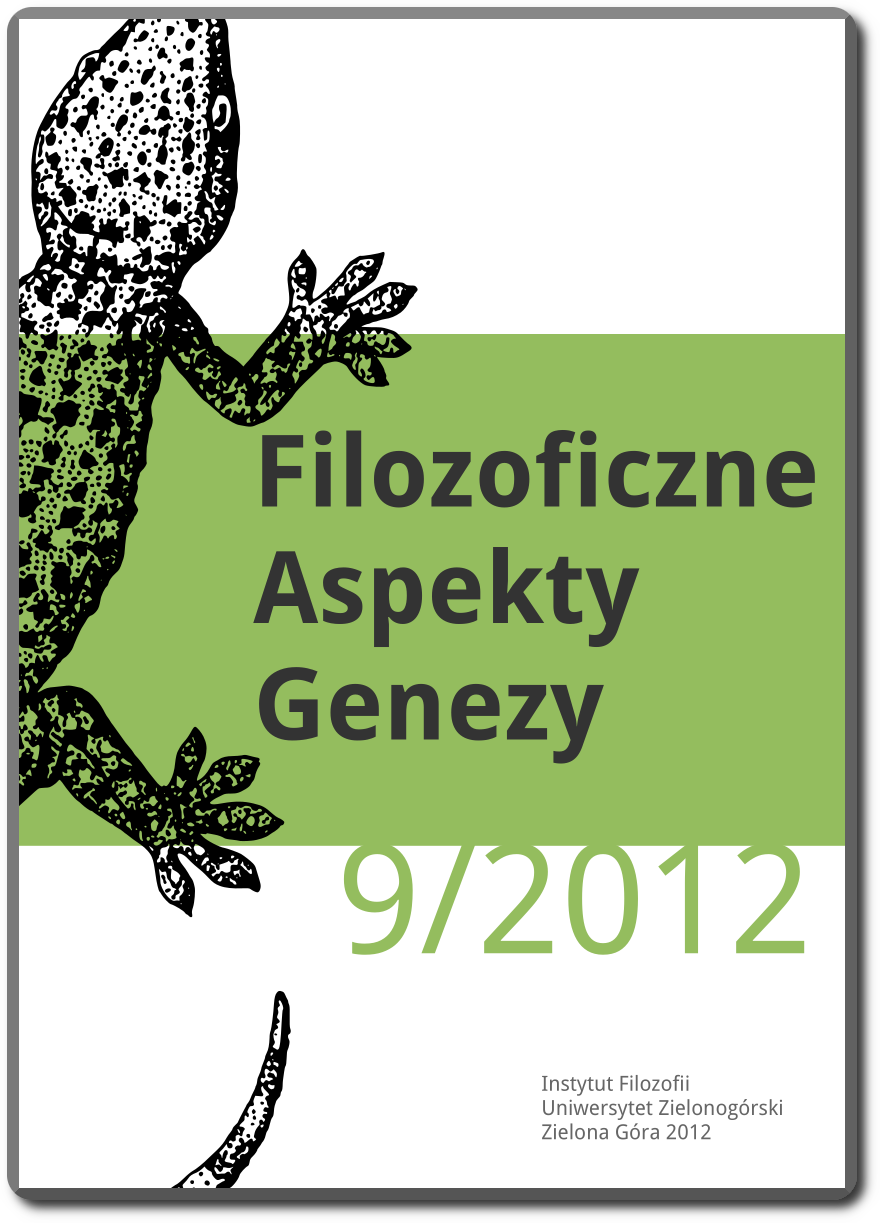Opublikowane 21.05.2021
Słowa kluczowe
- naturalizm metodologiczny,
- naturalizm metafizyczny,
- nauka,
- religia,
- argument z projektu
- argument z Boga w lukach wiedzy,
- argument z niewiedzy,
- wnioskowanie do najlepszego wyjaśnienia,
- teoria ewolucji,
- teoria inteligentnego projektu,
- kreacjonizm ...More

Utwór dostępny jest na licencji Creative Commons Uznanie autorstwa 4.0 Międzynarodowe.
Jak cytować
Abstrakt
W niniejszym eseju skoncentruję się na dwóch ważnych aspektach filozoficznego bagażu, który dźwigany jest w każdej dyskusji o stworzeniu i ewolucji. Oba te aspekty związane są z zagadnieniami natury metodologii naukowej. Pierwszy odnosi się do twierdzenia kreacjonistów, że ich hipoteza stworzenia powinna być uznana nie tylko za prawowitą naukową alternatywę dla teorii ewolucji, ale być może nawet za alternatywę lepszą. Drugi aspekt związany jest z ich twierdzeniem, że nauka, z racji stosowanych w niej metod, sama jest "panującą religią" i to o charakterze ateistycznym. Oba te twierdzenia są bezpodstawne. Negatywna kreacjonistyczna krytyka teorii ewolucji jest chybiona - kreacjoniści nie zaproponowali niczego, co choć w najmniejszym stopniu zasługiwałoby na miano pozytywnej naukowej alternatywy dla teorii ewolucji, a tylko wysuwają argument z niewiedzy. Wnioskowanie o projekcie nie potwierdza istnienia transcendentnego projektanta - niezależnie od tego, czy wnioskowanie to interpretowane jest jako argument z analogii, wniosko-wanie do najlepszego wyjaśnienia, czy też jako argument eliminacyjny. Ostatecznie okazuje się, że jest to jedynie błędny argument z Boga w lukach wiedzy. Teza kreacjonistów, że metoda naukowa jest dogmatycznie ateistyczna, także jest bezzasadna. Nauka, we właściwym rozumieniu, nie jest "panującą" religią, lecz zachowuje religijną neutralność.
Downloads
Bibliografia
- Petto Andrew J. and Godfrey Laurie R. (eds.), Scientists Confront Intelligent Design and Creationism, W. W. Norton & Company, New York — London 2007.
- Morris H., „Design Is Not Enough”, Back to Genesis 1999, vol. 127, s. a-c.
- Johnson P.E., Sąd nad Darwinem, przeł. Robert Piotrowski, Oficyna Wydawnicza „Vocatio”, Warszawa 1997.
- Discovery Institute, „The Wedge Strategy”, 1999 (2002).
- Gish D., Evolution? The Fossils Say NO!, 3rd ed., Creation-Life Publishers, San Diego 1978.
- Paley W., Natural Theology, Faulder, London 1802.
- W.A. Dembski, Intelligent Design: The Bridge Between Science and Theology, InterVarsity Press, Downers Grove, Illinois 1999.
- Meyer S.C., „The Return of the God Hypothesis”, Journal of Interdisciplinary Studies 1999, vol. 11 (1-2), s. 1-38.
- Sober E., Philosophy of Biology, Dimensions of Philosophy Series, Westview Press, Boulder, Colorado 1993.
- Harman G., „The Inference to the Best Explanation”, Philosophical Review 1965, vol. 74 (1), s. 88-95.
- Lipton P., Inference to the Best Explanation, Routledge, New York and London 1991.
- Pennock R.T., Tower of Babel: The Evidence Against the New Creationism, MIT Press, Cambridge, Massachusetts 1999.
- Pennock R.T., „The Wizards of ID: Reply to Dembski”, w: R.T. Pennock (ed.), Intelligent Design Creationism and Its Critics: Philosophical, Theological and Scientific Perspectives, MIT Press, Cambridge, Massachusetts 2001.
- Elsberry W.E., „Logic and Math Turn to Smoke and Mirrors: William Dembski’s «Design Inference»”, w: Andrew J. Petto and Laurie R. Godfrey (eds.), Scientists Confront Intelligent Design and Creationism, W. W. Norton & Company, New York — London 2007., s. 250-271.
- Dembski W.A., The Design Inference: Eliminating Chance Through Small Probabilities, Cambridge University Press, New York 1998.
- Dembski W.A., „Who’s Got the Magic”, Metanexus: The Online Forum on Religion and Science 2000, no. 042, przedruk w: R.T. Pennock (ed.), Intelligent Design Creationism and Its Critics: Philosophical, Theological and Scientific Perspectives, MIT Press, Cambridge, Massachusetts 2001, s. 639-644.
- Bradley W.L. and Olsen R., „The Trustworthiness of Scripture in Areas Relating to Natural Science”, w: E.D. Radmacher and R.D. Preus (eds.), Hermeneutics, Inerrancy, and the Bible, Zondervan, Grand Rapids, Michigan 1984, s. 283-348.
- Brown W., Twenty Questions for Evolutionists, Center for Scientific Creation, Phoenix, b.d.w, www.creationscience.com/onlinebook/main.html (27.07.2005).
- Salvini-Plawen L.V. and Mayr E., „On the Evolution of Photoreceptors and Eyes”, Evolutionary Biology 1977, vol. 10, s. 207-263.
- Goldsmith T.H., „Optimization, Constraint, and History in the Evolution of Eyes”, Quarterly Review of Biology 1990, vol. 65, s. 281-322.
- Land M.F. and Fernald R.D., „The Evolution of Eyes”, Annual Review of Neuroscience 1992, vol. 15, s. 1-29.
- Nilsson D.E. and Pelger S., „A Pessimistic Estimate of the Time Required for an Eye to Evolve”, Proceedings of the Royal Society of London 1994, vol. 256, s. 53-58.
- Behe M.J., Czarna skrzynka Darwina. Biochemiczne wyzwanie dla ewolucjonizmu, przeł. Dariusz Sagan, Biblioteka Filozoficznych Aspektów Genezy, t. 4, Wydawnictwo MEGAS, Warszawa 2008.
- Dorit R., „Biological Complexity”, w: R.T. Pennock (ed.), Intelligent Design Creationism and Its Critics: Philosophical, Theological and Scientific Perspectives, MIT Press, Cambridge, Massachusetts 2001, s. 231-249.
- Pennock R.T., „Whose God? What Science?: Reply to Behe”, Reports of the National Center for Science Education 2001, vol. 21 (3-4), s. 16-19.
- Behe M.J., „Reply to My Critics: A Response to Reviews of Darwin’s Black Box: The Biochemical Challenge to Evolution”, Biology & Philosophy 2001, vol. 16, s. 685-709.
- Pennock R.T., „Lions and Tigers and APES, Oh My! Creationism vs. Evolution in Kansas”, Science, Teaching and the Search for Origins, American Association for the Advancement of Science Dialogue on Science, Ethics and Religion, http://www.aaas.org/spp/dser/events/archives/conferences/CF_2000_04_1415_Teach/Abstract_Pennock.shtml.
- Lenski R., Ofria C., Pennock R.T., and Adami C., „The Evolutionary Origin of Complex Features”, Nature 2003, vol. 423, s. 139-144.
- Fitelson B., Stephens C., and Sober E., „How Not to Detect Design — Critical Notice: William A. Dembski, The Design Inference”, w: R.T. Pennock (ed.), Intelligent Design Creationism and Its Critics: Philosophical, Theological and Scientific Perspectives, MIT Press, Cambridge, Massachusetts 2001, przedruk z: Philosophy of Science 1999, vol. 66, s. 472-288.
- Fitelson B., Stephens C., and Sober E., „Jak nie należy wykrywać projektu”, przeł. Adam Trybus, Filozoficzne Aspekty Genezy 2007/2008, t. 4/5, s. 53-80, http://www.nauka-a-religia.uz.zgora.pl/index.php?action=tekst&id=161 (16.09.2012).
- Godfrey-Smith P., „Information and the Argument from Design”, w: R.T. Pennock (ed.), Intelligent Design Creationism and Its Critics: Philosophical, Theological and Scientific Perspectives, MIT Press, Cambridge, Massachusetts 2001.
- Monastersky R., „Seeking Deity in Details”, Chronicle of Higher Education 2001, vol. 48 (17).
- Pennock R.T., „DNA by Design? Stephen Meyer and the Return of God Hypothesis”, w: M. Ruse and W.A. Dembski (eds.), Debating Design, Cambridge University Press, New York 2004.
- Dembski W.A., „Signs of Intelligence: A Primer on the Discernment of Intelligent Design”, Touchstone 1999, vol. 12 (4), s. 76-84.
- Mitchell S.D., „Comment on Pennock’s Tower of Babel”. Artykuł odczytany na spotkaniu Association for Informal Logic and Critical Thinking (AILACT). American Philosophical Association Conference, Atlanta, Georgia 2001.



